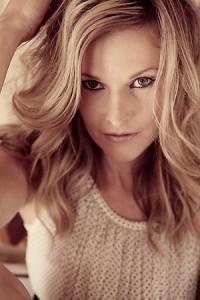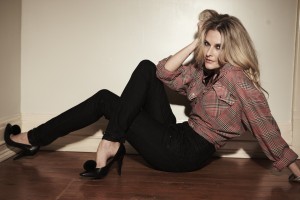Exclusive Q and A: Elizabeth Cook takes up the 'Gospel Plow'
posted in: Country • Exclusive Interviews
 Dazzling Elizabeth Cook had no sooner come off an incredible run with her Don Was-produced album Welder that she turned around and gave country fans another jolt with her latest album Gospel Plow, which offers southern gospel tunes with a folk-bluegrass flair. Once again, the much loved and lauded singer-songwriter has served fans a power-packed album full of vibrant, soulful songs wrapped around Cook’s lush southern vocals. As Cook prepares to again take center stage at the annual Americana Music Festival, held each September in Nashville, she took time out to talk about her latest album, her future music plans, and just what might change the whole trajectory.
Dazzling Elizabeth Cook had no sooner come off an incredible run with her Don Was-produced album Welder that she turned around and gave country fans another jolt with her latest album Gospel Plow, which offers southern gospel tunes with a folk-bluegrass flair. Once again, the much loved and lauded singer-songwriter has served fans a power-packed album full of vibrant, soulful songs wrapped around Cook’s lush southern vocals. As Cook prepares to again take center stage at the annual Americana Music Festival, held each September in Nashville, she took time out to talk about her latest album, her future music plans, and just what might change the whole trajectory.
OS: A lot of fans were surprised that after Welder you did Gospel Plow. What does Gospel Plow represent in your career?
EC: This is a little slice of what I do. It’s not all that I do and all that I appreciate. There are many, many layers to my connection to music.
OS: When did you first get into gospel music?
EC: It way very, very early on in my life that I began to appreciate that music. My parents send me to a Pentacostal church in my neighborhood. They didn’t go too much but they would send me. They believed in all ages in the same room at the same time and there was all kinds of great music around. That always stuck with me. I recognize it as a musical genre that I love. Elvis Presley, so many other artists that came up through the charts, loved it too.
OS: Do you see yourself doing more of this music?
EC: I may never make another album of this kind again and I may do another at some time. I don’t know.
 OS: I think of Ricky Skaggs saying that he’s a Christian who makes music not a Christian musician. Is it the same with you?
OS: I think of Ricky Skaggs saying that he’s a Christian who makes music not a Christian musician. Is it the same with you?
EC: Ricky is more entrenched in that as a lifestyle than I am but the music moves me more as spiritual and I hope it does for listeners, too, whether their relationships are with God or Buddha or [a different diety].
OS: How did you choose which songs to record?
EC: There is a certain song sub genre within gospel music that I really loved and wanted to address ” the southern gospel aspect. Some people go into the black blues route and some is real poppy and some is very real gospel, very vocal with some bluegrass instrumentation. There is an excitement with some hipsters who hear it. I thought nobody is doing the roots to which I’m deeply connected and I know some of those old songs. So I started looking around at taking the Bill Monroe approach. I told [husband, guitarist, and musical partner Tim Carroll] I wanted to treat it like bluegrass with John Fogerty playing ” no drums and three-part harmonics and apply that to southern gospel.
OS: I bet some fans are surprised by the change in theme of your music.
EC: It definitely has raised some eyebrows and many people question where I am going. Anyone who comes to a live show and knows me and knows my records probably isn’t surprised. They know we all come from a place where we are all walking contradictions. My voice applies to a lot of different perspectives and it’s important that I round out what I am bringing. I don’t want to make Welder again and I don’t want to make Balls again or Gospel Plow again. I don’t want to be redundant. This perhaps takes a little more patience but people are interested in accepting it and even feel it represents a little more complex narrative. I don’t want to always project a message that I’m this way or that way. I am not there yet. I want to keep the ball in play.
OS: That’s one thing I enjoy at festivals, hearing all of the different styles of formats. And you have some major artists and then you find some unknown artists that you really love.
EC: There is so much good music that I love at festivals. The big artists and headliners draw enough that it allows the newer artists a chance to play there. That kind of a festival experience makes music more important and relevant in people’s lives. And some of the fans look at festivals as more of a destination. It is really important for the industry and for humanity that they continue. They keep making music relevant and allow people to discover new things. My fear with commercial radio is that it makes some music irrelevant because it can become shallow and disposable. But there are enough good people in the trenches that we will be fine. I see outlaw country growing and getting better and stronger. 
OS: I know you have hosted “Apron Strings” on the Outlaw Radio station on Sirius for a while now. It must be fun discovering new music that way. I know I love all the different artists I hear on that channel.
EC: Outlaw country is a range of people like [Waylon Jennings and Willie Nelson] but also a lot of new Americana and singer-songwriters and a lot of new people. It’s great when people tune in and discover new people. But for now we’re touching base with people who love Neil Young, David Allan Coe, Emmylou Harris, the Old Crow Medicine Show, and then they’re hearing other artists that they perhaps didn’t know.
OS: Look in your crystal ball and tell me when we talk again in six months or a year, what will the big Elizabeth Cook news be?
EC: Well, we’ll probably be talking about a tour, and I’ll probably pop the clutch and be working on a new record this winter. I’ve got some Hollywood stuff coming at me and I’m trying to figure some of that out. That could distill and blow a hole in everything! If you know what’s going to happen, be sure to tell me!
Find out more about Elizabeth Cook’s music and shows on her official website.
Watch Elizabeth Cook perform “All the Time” from her album Welder:
More like this:
